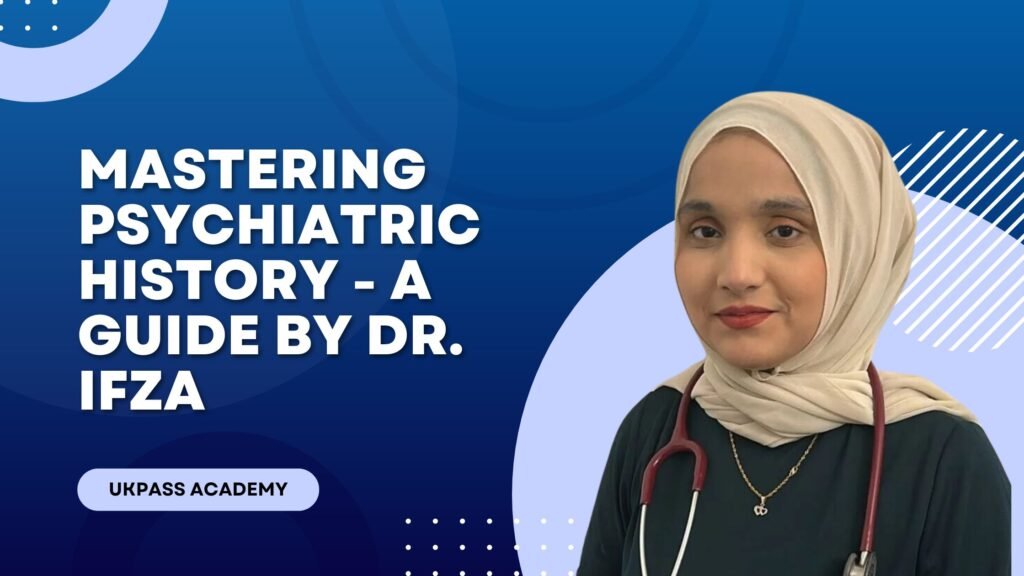Greetings, future medical professionals! Dr. Ifza here, and today we’re diving into the art of taking psychiatric histories, a crucial skill you’ll master at UKPASS Academy. Whether you’re gearing up for exams or preparing for real-world patient interactions, understanding these fundamentals is key. Let’s break it down step by step.
Understanding the Basics: P1 and Beyond
At the core of every psychiatric assessment lies the P1 – the presenting complaint. Here’s how you navigate through it effectively:
- Engage Empathetically: Begin by allowing the patient to articulate their main concern, whether it’s low mood, anxiety, or any other symptom.
- Explore Precipitating Events: Understand what triggered the symptoms. Was there a recent event or stressor?
- Assess Impact: How are these symptoms affecting the patient’s daily life – work, sleep, appetite, relationships?
- Identify Associated Symptoms: Probe beyond the main complaint to uncover related symptoms like insomnia, changes in appetite, or loss of interest in activities.
Past Histories Matter: Psychiatric and Medical
Moving beyond the present, delve into the patient’s history:
- Past Psychiatric History: Explore previous episodes, hospital admissions, treatments, and medication adherence.
- Past Medical History: Note any medical conditions, especially those like thyroid disorders that can influence psychiatric symptoms.
Introducing FEMISH: A Comprehensive Approach
UKPASS Academy adopts the mnemonic FEMISH to ensure a thorough evaluation:
- Family: Inquire about family history of psychiatric illnesses and the patient’s support network.
- Employment and Finances: Understand the patient’s work and financial stability, which can impact mental health.
- Forensic History: Assess any legal issues or encounters with the law.
- Substance Use: Question alcohol and drug habits, including recreational drugs.
- Medications: Document current medications, as some can induce psychiatric symptoms.
- Insight: Gauge the patient’s awareness of their condition and need for medical help.
- Sleep: Understand how the condition affects sleep patterns.
- Hallucinations: Crucial in specific conditions like schizophrenia, ask about perceptual disturbances.
Integrating Ideas, Concerns, and Expectations
Don’t overlook the patient’s psychological perspective:
- Ideas: What does the patient think is causing their symptoms?
- Concerns: Are there worries or fears about their condition?
- Expectations: What outcome or support are they hoping for?
Application in Practice
Practicing these principles at UKPASS Academy ensures you’re well-prepared for clinical scenarios:
- Normalization Techniques: Use empathetic language to normalize sensitive topics like self-harm or substance use.
- Structured Approach: Follow a systematic path from presenting complaint to comprehensive history, ensuring no crucial detail is missed.
- Scoring Points: In assessments, addressing ideas, concerns, and expectations is pivotal for high scores in data gathering and management.
Conclusion
Mastering psychiatric history-taking isn’t just about ticking boxes; it’s about forging connections with patients, understanding their unique experiences, and guiding them towards effective care. At UKPASS Academy, these skills are honed through practice, feedback, and a commitment to compassionate healthcare.
Remember, each patient brings a new opportunity to learn and grow as a clinician. Embrace the challenge, refine your approach, and you’ll soon find yourself confidently navigating the complexities of psychiatric assessments.
Best of luck in your journey, and stay tuned for more insights from UKPASS Academy. Until next time!
Dr. Ifza

